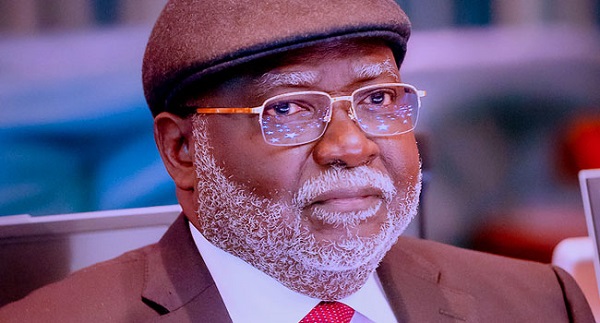Lawyers and key justice sector players have advocated far-reaching reforms in the appointment of judges and the administration of courts across the country.
If implemented, the recommendations will substantially whittle down the enormous powers of the office of the Chief Justice of Nigeria (CJN).
It will also reduce the overbearing influence of CJN and other heads of court in the administration of judicial institutions.
Other heads of courts, like the Chief Judges at Federal and State High Courts, will substantially shed their powers going by proposals for “sustainable reform of the judiciary.”
A two-day national summit on justice sector reform ended in Abuja on Thursday where varied issues inhibiting the efficient operations of Nigerian courts were discussed.
The event, which was declared open by Vice-President Kashim Shettima who represented President Bola Tinubu had in attendance the Senate President, Godswill Akpabio, the CJN, Mr Ariwoola and the Attorney-General of the Federation and Minister of Justice, Lateef Fagbemi.
Top lawyers and critical government functionaries, including the Chief of Army Staff, Christopher Musa, were at the occasion.
In a communique issued at the Federal Ministry of Justice in Abuja on Friday, the chairperson of the national summit on Justice 2024, Babatunde Ajibade, highlighted three priority areas of reforming Nigeria’s justice sector for optimum performance.
Summit and priority areas
The three priority areas include – the judicial appointment process, funding and budgeting, and delays in justice administration.
In Nigeria, there has been clamour for reforms in the justice sector to reduce the power concentrated in the CJN office. Besides being the head of the Supreme Court, the CJN heads crucial judicial institutions like the Federal Judicial Service Commission (FJSC) and the National Judicial Council (NJC).
These two institutions, the FJSC and NJC, are statutorily empowered to oversee the substantial part of appointing federal and state court judges.
“We believe that the appointment process of judges is a foundational matter because if we do not get the judicial appointment process right, it will be difficult to build anything significant on top of that,” Mr Ajibade, a Senior Advocate of Nigeria (SAN), told journalists on Friday.
He said these reform initiatives aimed at repositioning the Nigerian justice system through constitutional, statutory and operational changes.
The constitutional amendments required to bring about the reforms may take a while. Still, lawyers under the umbrella body of the Nigerian Bar Association (NBA) expressed hope that the Attorney-General of the Federation, Mr Fagbemi, would push through with the reforms.
The summit’s theme was “repositioning the justice sector in Nigeria, constitutional statutory and operational reforms for access and efficiency.”
The focus of the summit was on promoting cooperation and collaboration between all justice sector stakeholders.
The key areas of discussion included the validation and adoption of the revised national policy on justice from 2024 to 2028, which outlines a roadmap for significant reforms in Nigeria’s justice sector.
It also focused on consideration and consensus building on specific justice sector reform proposals.
The summit acknowledges the importance of collaboration between various stakeholders, including the executive, the judiciary, the Nigerian Bar Association, and development partners to achieve these goals.
Brainstorming sessions
While brainstorming on the issues, Bolaji Owasanoye, a law professor, argued that court administration should be professionalised, leaving Chief Judges with justice administration.
Speaking on the issue of poor budgetary allocation to the judiciary, Mr Owasanoye, a former chairperson of Nigeria’s anti-corruption agency, ICPC, advised the heads of courts to “open their books” for public scrutiny.
He said judicial accountability regarding its finances was crucial to bolstering public confidence in Nigeria’s justice system.
“If details of the judiciary’s budget are displayed on its website, members of the civil society organisations could begin to push for improved funding, but when it’s shrouded in secrecy, how do we begin to advocate for more transparency is lacking in how you spend what you have got?” Mr Owasanoye wondered.
Another major thrust at the summit was endemic delays in justice administration with many cases clogging court dockets for years unending.
Babatunde Fagbohunlu, a Senior Advocate of Nigeria, said judges and lawyers must be held to account for what he described as arbitrary postponement of cases without notice to parties.
Mr Fagbohunlu pointed out that such an issue is partly responsible for the slow pace of adjudication of cases.
The failure of courts to digitalise their proceedings has primarily been responsible for the backlog of suits, experts said.
The Chief Judge of Borno State, Kashim Zannah, said the digitalisation of court operations would eliminate delays in adjudication of cases.
Allegations of corruption in budgetary spending and judicial appointments
Two years ago, a retired justice of the Supreme Court, Ejembi Eko, lamented the corruption in the Nigerian judiciary, especially in the handling of its finances.
Mr Eko was not the only one. Two other justices of the Supreme Court Abdu Aboki and Dattijo Muhammad, while exiting the court, called for reforms.
In October 2023, Mr Muhammad, a Nigerian jurist for over 40 years, exited the Supreme Court bench with indelible remarks, criticising the Chief Justice of Nigeria (CJN), over the concentration of powers in the CJN’s office and judicial corruption.
Casting aside the conservative posture of judges, Mr Muhammed spoke of how merit had given way to family connections and lobbying in appointing judges.
He also criticised, citing references from public opinions, perverse decisions emanating from the Supreme Court and other Nigerian courts, as well as the flawed and arbitrary appointments of judges in the country.
Similarly, Chidi Odinkalu, a law professor and onetime chairman of the National Human Rights Commission, has consistently pilloried the process of judicial appointments in Nigeria.
Following in the same footsteps, then- Attorney-General of the Federation, Abubakar Malami, challenged the judiciary to open its budget.
Mr Malami said the federal government was not in a position to know whether the judiciary’s budget allocation was inadequate due to the opacity that characterises its financial records.
The judiciary’s budget has ballooned from N165 billion it received in the previous year to N342 billion in 2024, doubling by over 100 per cent.
But a budget breakdown remains hidden from the Nigerian public, a development that has raised questions among lawyers about the judiciary’s transparency and accountability in its spending.
Consensus
The consensus reached by participants at the summit was that the role of the NJC in discharging its responsibility for judicial appointments into the superior court of record required significant review.
“There was a concern expressed about the fact that the CJN, who is the chairman of the NJC, is also the chairman of the Federal Judicial Service Commission, which is the body that initially reviews proposals or lists of candidates by appointment into judicial office,” Mr Ajibade who chaired the summit planning committee said.
In addition, the summit resolved that there is a significant need for reform in the performance of the roles of the state Judicial Service Commission to ensure that that composition is more diverse, and that it reflects the interests of the users of the justice sector.
It emphasises that the focus should be on improved transparency in the appointment process, a focus on meritocracy and an emphasis on meaningful performance evaluations of those wo seek judicial office.
“There is a clear consensus on the need to professionalise the administration of the courts, acknowledging the fact that judges are by their training, not first in administration or management, but are trained to adjudicate over cases,” a part of the communique read.
The summit agrees that there is a need to appoint persons with clear administrative experience to be selected through a transparent process to administer the courts and to separate the administration of the courts from the administration of justice.
To bring these recommendations to fruition, the Attorney-General of the Federation, Lateef Fagbemi, was mandated to convert these discussions and resolutions into draft legislation that would be presented to the National Assembly for inclusion in the ongoing constitution review process and also for non-constitutional related legislation to be implemented immediately.
Although there are no timelines for implementing specific recommendations, the national policy on justice reforms is expected to be implemented from 2024 to 2028.
Support PREMIUM TIMES’ journalism of integrity and credibility
At Premium Times, we firmly believe in the importance of high-quality journalism. Recognizing that not everyone can afford costly news subscriptions, we are dedicated to delivering meticulously researched, fact-checked news that remains freely accessible to all.
Whether you turn to Premium Times for daily updates, in-depth investigations into pressing national issues, or entertaining trending stories, we value your readership.
It’s essential to acknowledge that news production incurs expenses, and we take pride in never placing our stories behind a prohibitive paywall.
Would you consider supporting us with a modest contribution on a monthly basis to help maintain our commitment to free, accessible news?
Make Contribution
TEXT AD: Call Willie – +2348098788999










